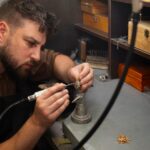In the quest for a good night’s sleep, many have turned to melatonin as a natural solution. Traditionally available in pill or liquid form, melatonin has gained popularity for its ability to regulate sleep-wake cycles and improve sleep quality.
However, recent advancements in delivery methods have brought about a new player in the market: melatonin nose spray.
This innovative approach to delivering melatonin directly through the nasal passages offers a promising alternative for those seeking better sleep. But how does it work, and what makes it different from other forms of melatonin supplements?
Understanding Melatonin
Before delving into the intricacies of melatonin nose spray, let’s first understand what melatonin is and how it affects our sleep.
Melatonin is a hormone produced naturally by the pineal gland in the brain. It plays a crucial role in regulating the sleep-wake cycle, also known as the circadian rhythm.
Melatonin levels typically rise in the evening, signaling to the body that it’s time to wind down and prepare for sleep. Conversely, levels decrease in the morning, helping to promote wakefulness.
The Nasal Route: How It Works
Melatonin nose spray offers a novel method of delivering this sleep-regulating hormone directly to the brain. By bypassing the digestive system, which can sometimes degrade the potency of oral supplements, nasal spray delivers melatonin more efficiently, leading to faster absorption and potentially quicker results.
When administered as a nasal spray, melatonin is absorbed through the mucous membranes lining the nasal passages and quickly enters the bloodstream. From there, it can reach the brain’s pineal gland, where it exerts its sleep-inducing effects.
Advantages of Nasal Spray
There are several advantages to using melatonin nose spray over traditional oral supplements:
1. Faster Absorption: Nasal spray allows for rapid absorption of melatonin into the bloodstream, making it ideal for those who need quick relief from sleep disturbances.
2. Reduced Dose: Because nasal spray delivers melatonin directly to the brain, lower doses may be needed compared to oral supplements, potentially reducing the risk of side effects.
3. Convenience: Nasal spray is easy to use and convenient, making it suitable for people who have difficulty swallowing pills or who are on the go.
4. Customizable Dosing: Nasal spray formulations often allow for more precise dosing, allowing individuals to adjust their melatonin intake according to their needs.
Efficacy and Safety Considerations
While melatonin nose spray shows promise as a sleep aid, it’s essential to consider its efficacy and safety.
Studies have shown that melatonin nose spray can effectively improve sleep quality and duration in individuals with various sleep disorders.
However, more research is needed to fully understand its long-term effects and compare its efficacy to other forms of melatonin supplementation.
The Science Behind Melatonin Nose Spray
Melatonin is a hormone naturally produced by the body’s pineal gland, primarily in response to darkness. It helps regulate the sleep-wake cycle, signaling to the body when it’s time to rest and when it’s time to wake up.
Supplemental melatonin is commonly used to alleviate sleep disturbances, such as insomnia or jet lag. When delivered through the nose via a spray, melatonin bypasses the digestive system, where it can sometimes be broken down or delayed.
This method of administration ensures that a higher percentage of the melatonin reaches the brain, where it can exert its sleep-promoting effects.
Advantages Over Oral Supplements
Melatonin nose spray offers several advantages over traditional oral supplements:
1. Rapid Absorption: Nasal administration allows melatonin to enter the bloodstream quickly, leading to faster onset of action compared to oral forms.
2. Increased Bioavailability: By avoiding the digestive system, more melatonin reaches the brain, potentially enhancing its effectiveness.
3. Precision Dosing: Nasal sprays often provide more precise dosing, allowing individuals to tailor their melatonin intake according to their needs.
4. Convenience: The ease of use and portability of nasal spray make it a convenient option for those who may have difficulty swallowing pills or need a travel-friendly sleep aid.
Clinical Evidence and Efficacy
Studies have shown promising results regarding the efficacy of melatonin nose spray for improving sleep quality and duration.
In a clinical trial published in the journal Sleep Medicine, researchers found that participants who used melatonin nose spray experienced significant improvements in sleep onset latency and total sleep time compared to those who received a placebo.
Another study published in the journal Chronobiology International demonstrated that melatonin administered via nasal spray was effective in synchronizing the sleep-wake cycle in individuals with delayed sleep phase disorder, a condition characterized by difficulty falling asleep at the desired bedtime.
Safety Considerations
While melatonin is generally considered safe for short-term use, it’s essential to exercise caution and follow recommended guidelines. Some potential side effects of melatonin supplementation include headaches, dizziness, and daytime drowsiness. Additionally, long-term effects and optimal dosing regimens for melatonin nose spray require further investigation.
Individuals should consult with a healthcare professional before starting any new sleep regimen, especially if they have underlying medical conditions or are taking medications that may interact with melatonin.
Conclusion
Melatonin nose spray offers a promising new avenue for improving sleep quality and managing sleep disorders. By delivering melatonin directly to the brain through the nasal passages, it bypasses the digestive system, leading to faster absorption and potentially enhanced efficacy.
While more research is needed to fully understand its long-term effects and compare its efficacy to other forms of melatonin supplementation, nasal spray represents a convenient and customizable option for those seeking better sleep.






